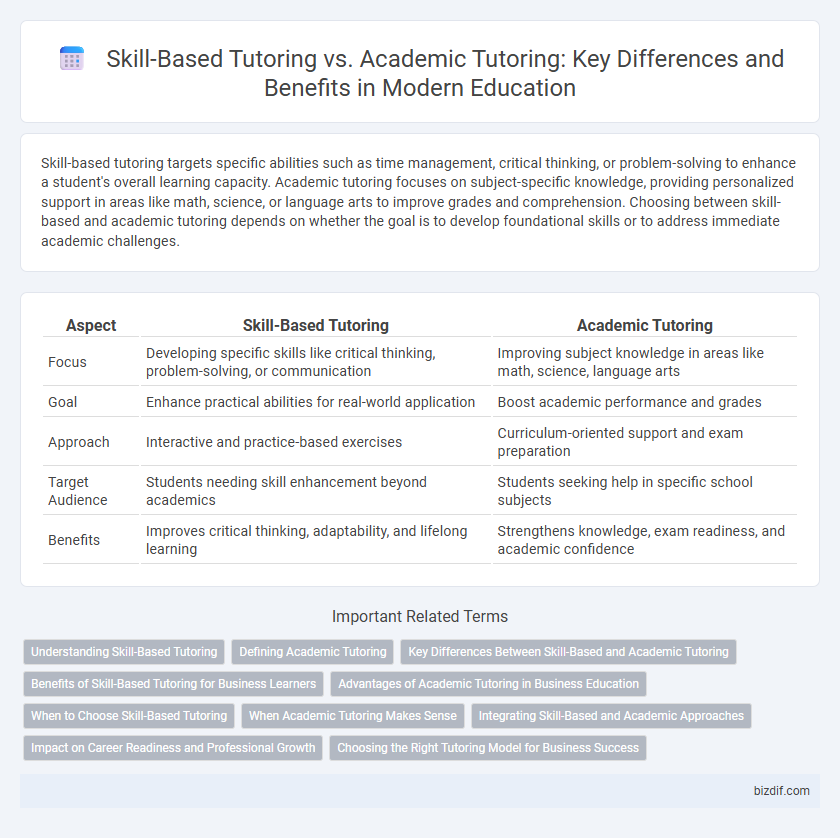Skill-based tutoring targets specific abilities such as time management, critical thinking, or problem-solving to enhance a student's overall learning capacity. Academic tutoring focuses on subject-specific knowledge, providing personalized support in areas like math, science, or language arts to improve grades and comprehension. Choosing between skill-based and academic tutoring depends on whether the goal is to develop foundational skills or to address immediate academic challenges.
Table of Comparison
| Aspect | Skill-Based Tutoring | Academic Tutoring |
|---|---|---|
| Focus | Developing specific skills like critical thinking, problem-solving, or communication | Improving subject knowledge in areas like math, science, language arts |
| Goal | Enhance practical abilities for real-world application | Boost academic performance and grades |
| Approach | Interactive and practice-based exercises | Curriculum-oriented support and exam preparation |
| Target Audience | Students needing skill enhancement beyond academics | Students seeking help in specific school subjects |
| Benefits | Improves critical thinking, adaptability, and lifelong learning | Strengthens knowledge, exam readiness, and academic confidence |
Understanding Skill-Based Tutoring
Skill-based tutoring emphasizes developing core competencies such as critical thinking, problem-solving, and time management, enabling students to apply skills across various subjects. This approach differs from academic tutoring, which targets specific curriculum content and exam preparation. Understanding skill-based tutoring helps learners build long-term academic success through enhanced cognitive and practical abilities.
Defining Academic Tutoring
Academic tutoring focuses on enhancing a student's understanding and performance in specific school subjects like math, science, or language arts by aligning sessions with curriculum standards and classroom instruction. This form of tutoring targets exam preparation, homework assistance, and concept mastery to improve grades and academic outcomes. Unlike skill-based tutoring, academic tutoring prioritizes subject-specific knowledge and educational achievement within formal education frameworks.
Key Differences Between Skill-Based and Academic Tutoring
Skill-based tutoring targets specific competencies such as reading fluency, math operations, or writing mechanics, emphasizing practical application and mastery of discrete skills. Academic tutoring addresses broader curriculum goals and content comprehension within subjects like history, science, or literature, aiming to improve overall academic performance and understanding. The key differences lie in skill specificity versus content scope, with skill-based tutoring fostering incremental skill acquisition and academic tutoring supporting holistic subject mastery.
Benefits of Skill-Based Tutoring for Business Learners
Skill-based tutoring enhances practical abilities such as communication, leadership, and problem-solving, directly benefiting business learners by improving workplace performance and career advancement opportunities. This approach targets specific competencies necessary in business environments, enabling learners to apply knowledge more effectively in real-world scenarios. By focusing on skill development rather than solely academic theories, skill-based tutoring fosters adaptability and confidence essential for business success.
Advantages of Academic Tutoring in Business Education
Academic tutoring in business education enhances students' understanding of core concepts like finance, marketing, and management, leading to improved academic performance and practical application. It provides structured guidance tailored to curriculum requirements, enabling learners to meet specific course objectives efficiently. Focused academic support helps develop critical thinking and analytical skills essential for navigating complex business scenarios successfully.
When to Choose Skill-Based Tutoring
Skill-based tutoring is ideal when students need to develop foundational abilities such as reading comprehension, math procedures, or critical thinking skills that support overall academic performance. This approach targets specific skill deficits rather than content mastery, making it effective for learners struggling with underlying learning gaps or needing personalized strategies for skill acquisition. Choosing skill-based tutoring benefits students who require focused intervention to build necessary competencies before progressing to higher-level academic content.
When Academic Tutoring Makes Sense
Academic tutoring makes sense when students struggle with specific subjects or need to improve their understanding of core curriculum concepts such as math, science, and language arts. It targets curriculum-based challenges, exam preparation, and homework assistance, helping learners meet grade-level standards. Academic tutoring is most effective when aligned with school requirements and standardized testing goals.
Integrating Skill-Based and Academic Approaches
Integrating skill-based tutoring with academic tutoring enhances student learning by targeting both foundational skills and subject-specific knowledge. This combined approach allows tutors to address underlying cognitive skills such as critical thinking and problem-solving alongside curriculum content, leading to improved comprehension and application. Research shows that blended tutoring methods increase student engagement and long-term academic performance more effectively than either method alone.
Impact on Career Readiness and Professional Growth
Skill-based tutoring enhances career readiness by focusing on practical competencies such as communication, problem-solving, and technical abilities directly applicable to workplace demands. Academic tutoring improves foundational knowledge and critical thinking skills that support long-term professional growth through mastery of subject matter. Combining both tutoring approaches offers comprehensive preparation, aligning educational development with evolving industry requirements and personal career objectives.
Choosing the Right Tutoring Model for Business Success
Skill-based tutoring targets specific competencies like time management and critical thinking to enhance overall performance, while academic tutoring focuses directly on subject matter mastery such as math or science. Businesses seeking to improve workforce efficiency often benefit more from skill-based tutoring, as it cultivates transferable skills that drive long-term success. Selecting the right tutoring model depends on organizational goals, employee skill gaps, and desired outcomes for measurable performance improvement.
Skill-Based Tutoring vs Academic Tutoring Infographic

 bizdif.com
bizdif.com